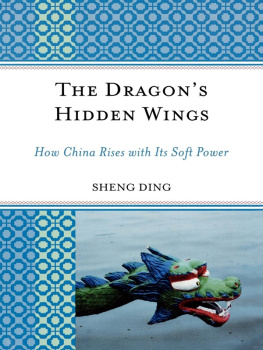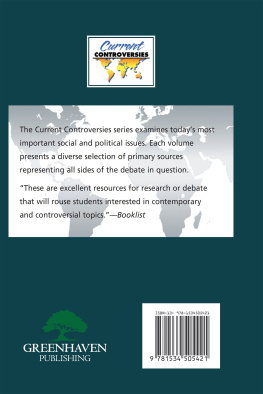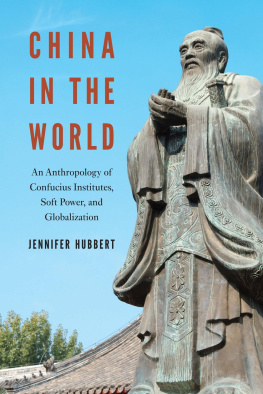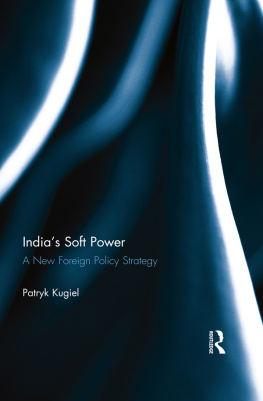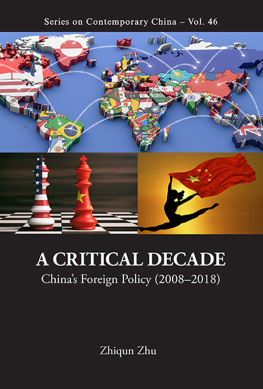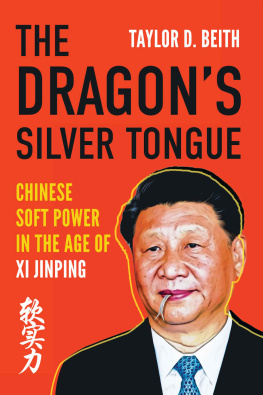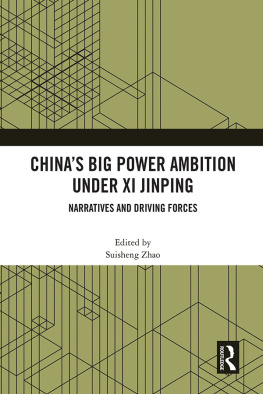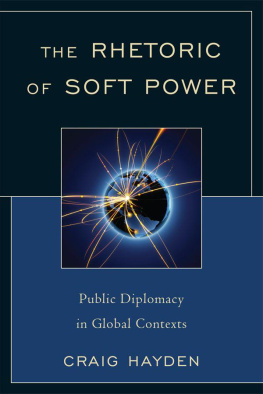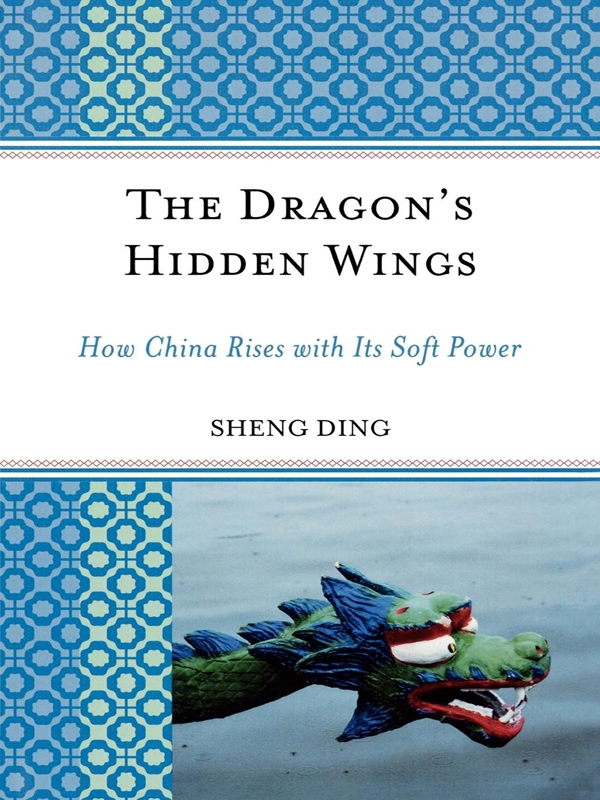Acknowledgments
This book draws in part on my doctoral dissertation and some papers I have given at various conferences since 2005. The overall argument has not appeared in print before, but some sections of the book have been published elsewhere. Parts of chapter 4 and chapter 7 are drawn from Talk Up China: An Analysis of Cultural Power and the Global Popularization of the Chinese Language, which was coauthored with Robert A. Saunders and published in East Asia: An International Quarterly 23, no. 2 (2006). Several segments of chapter 8 previously appeared in To Build a Harmonious World: Chinas Soft Power Wielding in the Global South, Journal of Chinese Political Science 13, no. 2 (2008). Parts of chapter 9 were published in Digital Diaspora and National Image Building: A New Perspective on Chinese Diaspora Study in the Age of Chinas Rise, Pacific Affairs 80, no. 4 (2007).
Writing this book is one of the most challenging intellectual journeys in my life. So many people have generously provided me with the much-needed road map and support. First and foremost, my deepest appreciation goes to my parents in Yanzhou, China. My father, Ding Guangyuan, and mother, Qiu Yuelan, didnt have opportunities for higher education in the years of the Cultural Revolution. They have had great expectations of me since my childhood. Their unconditional love has been the greatest source of inspiration for me to deal with all kinds of challenges. I feel guilty that I cannot look after them while they struggle with failing health. I am so grateful to my younger sister, Ding Li, who has unselfishly taken very good care of our parents in recent years.
The first and second parts of this book are based on my doctoral dissertation completed at RutgersNewark. Professor Yale H. Ferguson is one of the most important persons in my life. Without his unflagging support and guidance, I would never have been able to come to the United States, start my graduate study, and obtain my Ph.D. degree. Professor Rey Koslowski, my dissertation director, has always effortlessly guided and stimulated me through numerous conversations and communications. His guidance in the early stage of my book writing is very helpful. My special thanks also go to Professor Richard Langhorne for his exceptional guidance and for sparking my interest in the various themes of this text. My wife and I will never forget those wonderful lunches and Thanksgiving dinners at these professors homes. In addition, I am so grateful to Professor Richard Wilson of RutgersNew Brunswick for his guidance and encouragement. All of these professors have given me so many thoughtful inputs at each step of writing my dissertation. They are also my models for becoming a competent scholar and teacher.
In the course of research and writing, so many friends have helped me in various ways. Robert A. Saundersmy friend and classmate at Rutgerscoauthored with me on two refereed journal articles. His academic companionship was helpful in the early stage of my academic career. I am so grateful to Sujian Guo, who has provided valuable comments and guidance on this books revision and publication. Special thanks also go to Fei-ling Wang. I have benefited from his many e-mail tips and comments on Chinese political study via his listserv cps@lists.gatech.edu. Yanzhong Huang coauthored with me a conference paper on Chinas soft power, which was presented at the 2005 International Studies Association annual meeting and later published in a refereed journal. I also want to thank Joseph Parry of Lexington Books for his patience and guidance, and an anonymous reviewer for his (her) critical but helpful comments on my book manuscript.
It is Bloomsburg University where I finally completed my book manuscript. I feel lucky that I can teach here, develop new courses, and contribute to designing a new graduate program. My colleagues in the Department of Political Science are extremely supportive. I would like to extend my thanks to many colleagues at Bloomsburg University who have given me a lot of help and encouragement. I am also indebted to the Research and Disciplinary Grant Program at Bloomsburg University for its generous research support.
The completion of this manuscript coincided with several important things in my life. My wife and I moved from New Jersey to Pennsylvania after I accepted my current position at Bloomsburg University. This is an important milestone in our life journey in America. We owe a debt of appreciation to many new friends who have provided their generous help to us during the last two years. My first childHaidi (Heidi)was born in December 2007. A great deal of revision work on this manuscript was done beside Haidis cradle. She is such a beautiful and adorable baby who has brought us much joy and many surprises.
Finally, my sincerest thanks, go to my wife, Hongyan Yuan. I could not have completed this book without her. We have been through fourteen years of life together since we met each other in our college in Beijing. She complements me in many aspects and makes me a better person. Her love, patience, and trust are my most important sources of strength. I want to dedicate this book to her.
About the Author
Sheng Ding is an assistant professor of political science at the Bloomsburg University of Pennsylvania. He received his Ph.D. from the Division of Global Affairs at Rutgers University in 2006. His articles have appeared in Pacific Affairs, Nationalism & Ethnic Politics, East Asia: An International Quarterly, and Journal of Chinese Political Science.
Prior to his graduate study in the United States, he had worked as an assistant research fellow at China Institute of Contemporary International Relations from 1997 to 2000. He has published many scholarly articles in China. He holds an M.A. in Political Science from Rutgers-Newark and a LL.B. from the University of International Relations in Beijing.
Conclusion
China is clearly on the rise. Although there are some disputes about the speed and extent of this global phenomenon, much attention has been paid to the question of whether Chinas growing power portends a threat. Most China observers point to Chinas territorial and demographic size, its fast-growing economy, and its increasing national defense budget as evidence that China may become a revisionist power capable of dominating East Asia and challenging Americas interests globally. At least three themes have been prominent in the current debates over the implications of Chinas rise in the twenty-first century: (1) How strong are Chinas current economic prowess and military strength? And to what extent will Chinas national power continue to increase? (2) What are a rising Chinas policy orientations? Does it seek to aggressively challenge and change the international system? (3) How should the United States and other countries respond to Chinas rise? In searching the answers to these questions, most attention has been paid to Chinas use of hard powerits ability to use economic inducement and sanction or military threat and invasion to get its way. The second face of Chinas growing powerthe ability of its ideas and values to shape the world through attraction and agenda-settinghas not received much attention in both academia and the policy world.
Moreover, since Joseph Nye coined the term soft power in 1990 and developed its related arguments in his books and articles, the concept of soft power has received increasingly more attention from scholars, the media, and the public. So far, there are a lot of news reports, a few journal articles and policy reports, and one book addressing Chinas soft power from various perspectives. However, all of them try to directly apply Nyes definition of soft power and the related arguments which were developed on the basis of American soft power to the study of Chinas soft power. A persuasive study on Chinas own soft power and how a rising China wields its own soft power have not yet been conducted. This book The Dragons Hidden Wings: How China Rises with Its Own Soft Power not only endeavors to examine the connections between the current rise of China and what Joseph Nye defines as soft power, but also attempts to provide readers with a more complete understanding of Chinas national power and rising process from a new perspective.

